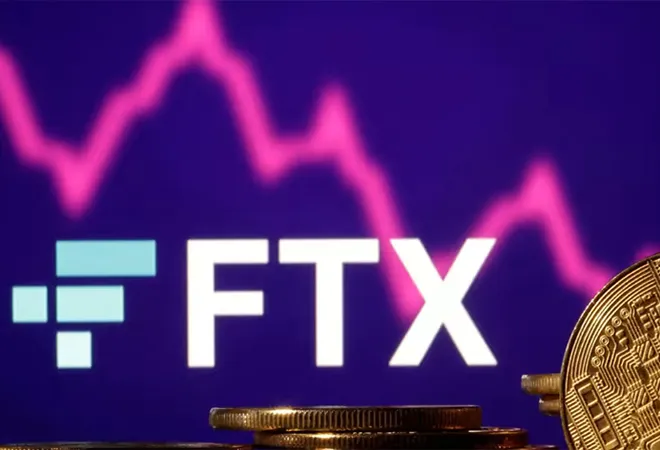
The cryptocurrency revolution has fallen victim to its own hype. This year, the collapse of the supposed “stablecoin” Terra USD in May erased US$ 60 billion in market value, and a further US$ 300 billion as its collapse rippled through the crypto space. The latest in a spate of crises was the crash of FTX, a major global cryptocurrency exchange, triggering bankruptcy filings across the ecosystem. “The FTX meltdown signals end to crypto’s ‘Wild West’ days” declared one headline.
The latest in a spate of crises was the crash of FTX, a major global cryptocurrency exchange, triggering bankruptcy filings across the ecosystem.
The FTX collapse seems to have vindicated regulators that have banned or otherwise restricted cryptocurrencies, potentially becoming the nail in the coffin of India’s fledgling cryptocurrency market. Cryptocurrency crashes are not a long-term challenge in themselves. The Bitcoin crash in 2018 had many speculating the crypto bubble had burst, but as recently as November 2021, BTC prices had reached an all-time high. Crypto coins frequently “die” out, often because they were abandoned by the developers, or failed to achieve enough volume. This was especially true in the early years, between 2011 and 2014 when many coins simply failed to take off.
The crypto space is now, however, facing a long winter.
Crypto in crisis
The first factor behind this chill is the proliferation of scams: in 2021, of the 68 crypto coins that have been declared dead, 35 were scams or “joke” coins. The US’ Federal Trade Commission reported that social media crypto investment scams led to US$ 680 million in losses in 2021. In India, scammers duped 1,400 people of an estimated US$ 14 million on a fake crypto coin. In South Korea, executives of crypto exchange V Global were sentenced to prison over a US$ 1.7 billion fraud. Scammers often use the funds received from one victim to give payouts to new ones, creating the illusion of returns, and luring them into investing more and more of their savings. Many of these criminals make use of the hype around crypto, and the promise of a quick buck, paired with the relatively surface-level understanding of Web 3.0 and its underlying technologies. The concept of the blockchain (which predates cryptocurrencies) for instance is elegant and logically appealing enough to generate a sense of credibility about things built upon it, like cryptocurrencies and NFTs.
It is no surprise then that some Indian financial experts were lauding the Reserve Bank of India’s caution on cryptocurrencies.
The second, more insidious, factor then is the crisis of trust. Before it crashed, FTX was briefly the world’s second-largest exchange in the crypto futures market. Among its investors were notable names such as SoftBank, Sequoia Capital, and Temasek. The impact of the crash has fallen primarily on markets like Singapore, South Korea, and Japan, the first of which has become a hub for crypto companies leaving the US. However, this series of high-profile crypto crises are seeing these countries clamp down on the crypto market as well. If “trusted” exchanges can fail, where can individual investors turn to? While massive funds can simply write off these losses as failed investments, individuals who have poured in their life savings into cryptocurrencies do not have that luxury. The stories of overnight millionaires and inflated expectations about the revolutionary nature of cryptocurrencies, as peddled by crypto evangelists, are part of the problem: The demise of cryptocurrencies may then stem from the misinformation spread by their own biggest advocates. It is no surprise then that some Indian financial experts were lauding the Reserve Bank of India’s caution on cryptocurrencies. More broadly, the successive failures in the crypto ecosystem are a stream feeding into the ocean that is the techlash—the growing skepticism and negative sentiments about tech giants in particular and technology solutions in general. The change in tone of media coverage on cryptocurrencies has followed the techlash trend, and in some ways creates a self-fulfilling prophecy. One study on Bitcoin, for instance, shows that news coverage of crypto-related crimes and crypto governance have a statistically significant negative impact on the price of Bitcoin.
In the short term, however, the crisis of trust following on the heels of several prominent crashes and scams in this ecosystem will re-relegate cryptocurrencies to the realm of the evangelists,, and legitimise regulation and centralisation.
The jury is still out on whether the crypto chill will thaw out, heralding a new spring. In the short term, however, the crisis of trust following on the heels of several prominent crashes and scams in this ecosystem will re-relegate cryptocurrencies to the realm of the evangelists, the tech bros if you will, and legitimise regulation and centralisation.
The views expressed above belong to the author(s). ORF research and analyses now available on Telegram! Click here to access our curated content — blogs, longforms and interviews.




 PREV
PREV


